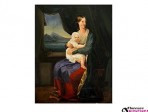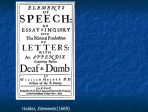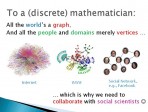 00:30:00
00:30:00
Dream to reality?
Plastics pioneers had great aspirations for their new materials. Roland Barthes called plastics “a miraculous substance . . . a transformation of nature”. Serendipity, careful experimentation and entrepreneurial skills have all played significant....
More details | Watch now 01:00:00
01:00:00
‘Against images made by hands’: Florence Nightingale’s reluctant life in portraiture
Florence Nightingale disliked having her portrait taken as much as she hated being a celebrity, yet it was largely through the visual representations of her face and person in the press that she gained iconic status in Victorian England. Used as a mo....
More details | Watch now 01:00:00
01:00:00
What it means to be human
What does it mean to be human, and what makes us so? Does our brain, how we evolved, how we communicate, or how we interact make us human? Are we really so different from the other animals? An exploration of the boundaries of human nature, chai....
More details | Watch now 01:00:00
01:00:00
Shakespeare the metallurgist, Eliot the spectroscopist: the cultural journey of the chemical elements
From the moment of their discovery, each of the chemical elements has embarked on a journey into our culture. Over millennia and decades, they have gained meaning through encounter and manipulation. Those long known, such as gold, silver, iron and su....
More details | Watch now 01:00:00
01:00:00
How new science is transforming the optical microscope
There are two rules for making an optical microscope; the lenses must be small, since defects of colour and focus increase with lens size, and the lenses must capture light from the object over as wide an angle as possible to record fine detail. This....
More details | Watch now 01:00:00
01:00:00
Ruder Boscovic, the eighteenth-century polymath
Roger Boscovich (1711-1787) was a true polymath, making original contributions in science, technology and the humanities. He was born in Dubrovnik but spent much of his working life in Rome, at the Collegium Romanum. This lecture will introduce his l....
More details | Watch now 01:00:00
01:00:00
Stones from the sky: A heaven-sent opportunity to talk about science
Meteorites provide us with laboratory samples from distant bodies including asteroids, comets, the moon, Mars and even ancient stars. Witnesses to the extraordinary event when one is seen to fall from the sky, or anyone finding a sample on the ground....
More details | Watch now 00:59:00
00:59:00
Teaching language to the deaf in the 17th century: the dispute between John Wallis and William Holder
In the early years of the Royal Society an acrimonious dispute broke out between John Wallis and William Holder as to which of them had been successful in the ÔexperimentÕ of teaching the deaf child Alexander Popham to speak. Using evidence from th....
More details | Watch now 00:44:00
00:44:00
Standing on the shoulders of giants: cumulative culture and social learning strategies
Building upon the knowledge of others over many generations, currently referred to as cumulative cultural evolution, is arguably unique to humans and widely thought to be responsible for our success in colonising virtually every terrestrial habitat o....
More details | Watch now 01:05:00
01:05:00
Pandemic Influenza: one flu over the cuckoo’s nest
Where do the pandemic influenza viruses come from and why did experts fail to predict the severity of the 2009 pandemic? However to date, the 2009 H1N1 pandemic influenza has been much less severe than the 1918 Spanish influenza.
More details | Watch now 00:45:00
00:45:00
The Mathematics of Web science.
The Web and associated technological and social networks provide both mathematical challenges and opportunities. How do we model the evolution of these networks taking into account both observed features and incentives?
More details | Watch now 00:46:00
00:46:00
Enhancing communication and structured data on the Web
Rigid interfaces force people to present or look at information the wrong way. We need a new generation of flexible Web tools that help people gather the information they want from wherever it is, organize it however they like, create the interaction....
More details | Watch now
